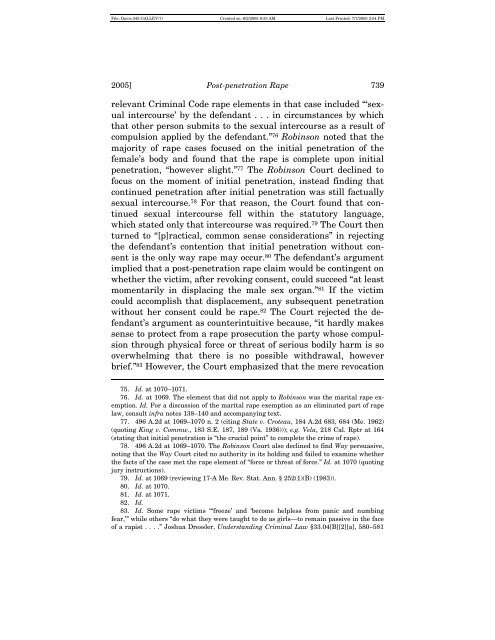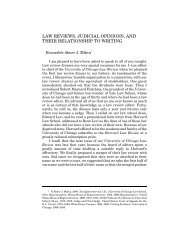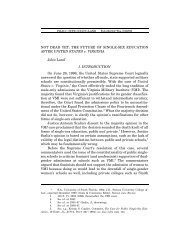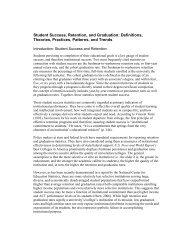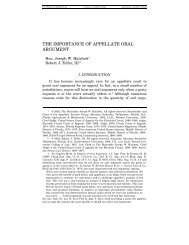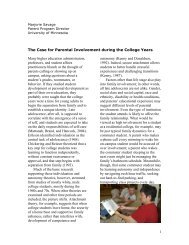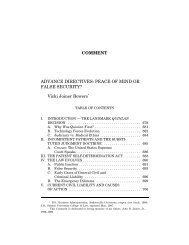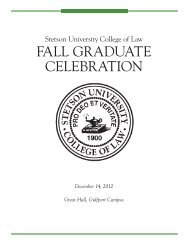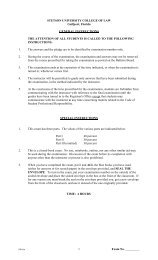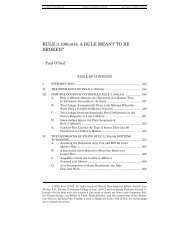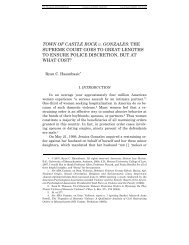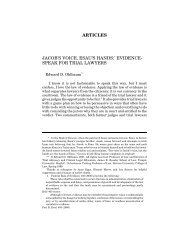the evolution of post-penetration rape law - Stetson University ...
the evolution of post-penetration rape law - Stetson University ...
the evolution of post-penetration rape law - Stetson University ...
You also want an ePaper? Increase the reach of your titles
YUMPU automatically turns print PDFs into web optimized ePapers that Google loves.
File: Davis.343.GALLEY(7) Created on: 6/2/2005 9:33 AM Last Printed: 7/7/2005 2:54 PM2005] Post-<strong>penetration</strong> Rape 739relevant Criminal Code <strong>rape</strong> elements in that case included “‘sexualintercourse’ by <strong>the</strong> defendant . . . in circumstances by whichthat o<strong>the</strong>r person submits to <strong>the</strong> sexual intercourse as a result <strong>of</strong>compulsion applied by <strong>the</strong> defendant.” 76 Robinson noted that <strong>the</strong>majority <strong>of</strong> <strong>rape</strong> cases focused on <strong>the</strong> initial <strong>penetration</strong> <strong>of</strong> <strong>the</strong>female’s body and found that <strong>the</strong> <strong>rape</strong> is complete upon initial<strong>penetration</strong>, “however slight.” 77 The Robinson Court declined t<strong>of</strong>ocus on <strong>the</strong> moment <strong>of</strong> initial <strong>penetration</strong>, instead finding thatcontinued <strong>penetration</strong> after initial <strong>penetration</strong> was still factuallysexual intercourse. 78 For that reason, <strong>the</strong> Court found that continuedsexual intercourse fell within <strong>the</strong> statutory language,which stated only that intercourse was required. 79 The Court <strong>the</strong>nturned to “[p]ractical, common sense considerations” in rejecting<strong>the</strong> defendant’s contention that initial <strong>penetration</strong> without consentis <strong>the</strong> only way <strong>rape</strong> may occur. 80 The defendant’s argumentimplied that a <strong>post</strong>-<strong>penetration</strong> <strong>rape</strong> claim would be contingent onwhe<strong>the</strong>r <strong>the</strong> victim, after revoking consent, could succeed “at leastmomentarily in displacing <strong>the</strong> male sex organ.” 81 If <strong>the</strong> victimcould accomplish that displacement, any subsequent <strong>penetration</strong>without her consent could be <strong>rape</strong>. 82 The Court rejected <strong>the</strong> defendant’sargument as counterintuitive because, “it hardly makessense to protect from a <strong>rape</strong> prosecution <strong>the</strong> party whose compulsionthrough physical force or threat <strong>of</strong> serious bodily harm is sooverwhelming that <strong>the</strong>re is no possible withdrawal, howeverbrief.” 83 However, <strong>the</strong> Court emphasized that <strong>the</strong> mere revocation75. Id. at 1070–1071.76. Id. at 1069. The element that did not apply to Robinson was <strong>the</strong> marital <strong>rape</strong> exemption.Id. For a discussion <strong>of</strong> <strong>the</strong> marital <strong>rape</strong> exemption as an eliminated part <strong>of</strong> <strong>rape</strong><strong>law</strong>, consult infra notes 138–140 and accompanying text.77. 496 A.2d at 1069–1070 n. 2 (citing State v. Croteau, 184 A.2d 683, 684 (Me. 1962)(quoting King v. Commw., 183 S.E. 187, 189 (Va. 1936))); e.g. Vela, 218 Cal. Rptr at 164(stating that initial <strong>penetration</strong> is “<strong>the</strong> crucial point” to complete <strong>the</strong> crime <strong>of</strong> <strong>rape</strong>).78. 496 A.2d at 1069–1070. The Robinson Court also declined to find Way persuasive,noting that <strong>the</strong> Way Court cited no authority in its holding and failed to examine whe<strong>the</strong>r<strong>the</strong> facts <strong>of</strong> <strong>the</strong> case met <strong>the</strong> <strong>rape</strong> element <strong>of</strong> “force or threat <strong>of</strong> force.” Id. at 1070 (quotingjury instructions).79. Id. at 1069 (reviewing 17-A Me. Rev. Stat. Ann. § 252(1)(B) (1983)).80. Id. at 1070.81. Id. at 1071.82. Id.83. Id. Some <strong>rape</strong> victims ‘“freeze’ and ‘become helpless from panic and numbingfear,’” while o<strong>the</strong>rs “do what <strong>the</strong>y were taught to do as girls—to remain passive in <strong>the</strong> face<strong>of</strong> a rapist . . . .” Joshua Dressler, Understanding Criminal Law §33.04[B][2][a], 580–581


